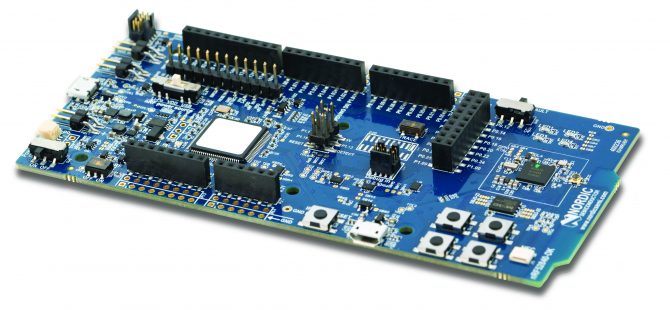
AI, machine learning made accessible on resource-constrained wireless IoT chips
EP&T Magazine
Automation / Robotics Electronics Semiconductors Wireless Engineering IoT Supply Chain AI chip IoT semiconductor wirelessEnables applications to model and understand their operating environments and make intelligent decisions
Nordic Semiconductor, Oslo Norway, has enter into a partnership with Edge Impulse, a leading provider of what’s termed ‘tiny machine learning’ or ‘TinyML’ tools designed to run on resource constrained semiconductor devices. The collaboration will permit Nordic Semi’s nRF52 and nRF53 Series Bluetooth Low Energy (LE) chips to benefit from easy-to-use AI and machine learning features as standard. This is a first for the Bluetooth semiconductor industry.
“What AI and machine learning on resource-constrained chips does – which Nordic will now collectively refer to as TinyML – is take the application potential of wireless IoT technologies such as Bluetooth to a whole new level in terms of environmental awareness and autonomous decision making,” comments Kjetil Holstad, Nordic’s director of product management.

Source: Nordic Semiconductor
“Although we have had customers build and run TinyML applications on Nordic’s Bluetooth chips in the past, before now this required quite a high level of mathematical and computer programming expertise using professional science industry and academia software like MATLAB.”
Camera vision models to monitor
One example of the above is two successful projects in the Hackster.io and Smart Parks backed ‘ElephantEdge’ wildlife tracker challenge that employed Nordic’s nRF52840 System-on-Chip (SoC). These included an award-winning design by Dhruv Sheth called ‘EleTect’, a TinyML and IoT smart wildlife tracker employing the nRF52840 SoC as well as an accelerometer, camera and microphone.
Sheth’s different TinyML models included: Camera vision models to monitor the risk of poaching and predators or to monitor elephant movements; accelerometer data models to predict and classify common elephant behaviors; and audio data models to detect and classify elephant musth data and mood swings (a periodic condition in male elephants characterized by highly aggressive behavior that can place them in conflict with humans).
These models were made ready for deployment in three forms including a C++ library, Arduino library, and OpenMV library all available on GitHub.
“What our partnership with Edge Impulse will do is remove all the complexity and previous technological barriers-to-entry for our customers wishing to add TinyML features to their Bluetooth applications,” continues Holstad. “In fact using Edge Impulse tools, Nordic customers could be up and running TinyML on their applications within an afternoon. And at an ultra-low power consumption level that still supports extended battery operation, even from small batteries.”
